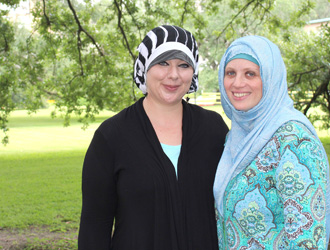Students learn about working with the Muslim community
The Muslim community is one of the fastest growing, with seven million members in the United States and 1.5 billion worldwide. They represent a variety of racial backgrounds including people of African American, South Asian and Arab descent.

Muslim social work professionals Taslim van Hattum, left, and Jenny Yanez come to the uptown campus to talk with Tulane students about working with Muslim clients. (Photo by Joseph Halm)
“There is not a 100 percent monolithic experience that all Muslims have at one time, but there are some aspects of Muslim culture that you have to understand to be able to work with clients,” Tulane alumna Taslim van Hattum said. “Pretty much every single decision is based on our religious foundation.”
Van Hattum, who received a master's degree in social work in 2006 and master's in public health in 2007 from Tulane, works at the Louisiana Public Health Institute as an organizer, social worker and public health professional. Fellow presenter Jenny Yanez, who also holds a master of social work degree, is a community organizer at Puentes New Orleans. Both women serve as field instructors for Tulane master's of social work students.
“I don't think there is a hard and fast rule when working with Muslim clients,” Yanez says. “Inclusion is important because when we talk about cultures in America, many Muslims are now second or third generation, so this is our culture too.”
Because of the differences in cultures, Van Hattum said clinicians may never receive full disclosure from a Muslim client, but that's OK. Each client is different, but even without full disclosure, positive work can be done.
“Full disclosure takes a very long time, if it ever happens,” she said. “Knowing that is OK is important. Gaining the trust of your client is key, and you need to let them guide you where they need to go.”
Joseph Halm is marketing/communications coordinator for the Tulane School of Social Work.
